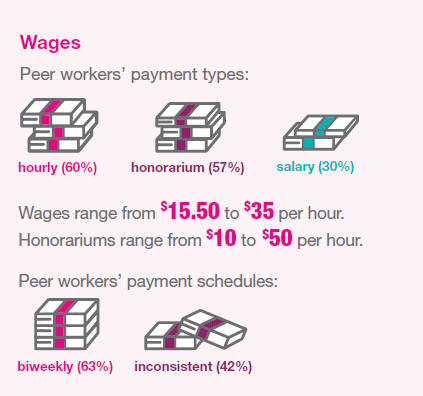
Centering the expertise of people with lived and living experience of mental illness and/or substance use is crucial to building healthier communities and better systems of care.
Over the past few years, CMHA BC has led a community-based research project to map and assess peer work in British Columbia’s mental health and substance use sector. Through this research, CMHA BC has created resources that translate findings for academia, government, peers, peer-employing organizations and anyone who values peer work in the mental health and substance use sector.
Thank you to the Vancouver Foundation for funding this important work.
The Project
Across BC, the mental health and substance use sector employs hundreds of experiential workers, or “peers”, in various roles such as support workers, facilitators, frontline harm reduction workers, and researchers. Peers utilize their lived and living experience of mental health and substance use challenges to inform how they carry out their work. Peers are primarily employed in service delivery positions at overdose prevention sites, mental health and substance use centers, hospitals, and within interdisciplinary outreach teams.
In 2020, CMHA BC began researching the experiences of peer workers within BC’s mental health and substance use sector with the aim of illuminating their experiences and offering systemic recommendations to government that will support and empower the growing number of peer workers across the province who are doing incredibly meaningful and valuable work.
This has resulted in important research and recommendations to support and enhance peer work across the sector, tools for employers to best support and empower peers, and resources for peers to reflect on their own work experiences.
The Research
Employing a community-based research approach, the CMHA BC team surveyed 59 employers of peers about their peer employment conditions and interviewed 30 peers about their workplace experiences. The number of peer positions estimated to exist across BC at the time the research was conducted was 400 paid peer roles. Findings from these surveys and interviews informed the creation of tools to support peer empowerment and co-production at organizations where peers work, and recommendations to support systemic peer empowerment and co-production within the entire mental health and substance use sector.
The findings indicate that livable wages and pay equity are necessary but not sufficient. The achievement of co-production requires a transformation of the employment relationship and the surrounding system that not only equalizes power between peers and their employer but also strives to create universally inclusive and accessible workplaces and services.

How do we define ‘peer’?
A peer is someone who applies their knowledge and experience of mental illness or substance use to the performance of their job duties within healthcare, community or social service settings.
What is co-production?
An equitable relationship where peer and non-peer colleagues share power and partner on the design, development, delivery, and evaluation of mental health and substance use policies, services, and systems.
Where are peers working?
We are striving towards a future where all mental health and substance use services are led and informed by lived and living experience. There is a large and diverse workforce of over 400 peer workers in BC. The majority of peer positions and programs are located in the Lower Mainland and Vancouver Island, with a concentration in urban centers.

Download the Peer Employment Resources
The Power of Peer Employment: Virtual Info Session
In this 1-hour information session, you will learn about the overall research project and key findings, including the status of peer work in BC, best practices and recommendations, and how you, as an organization or peer, can use the four new resources from the report.
Download the PowerPoint slides and watch the recording.
Additional Resources
To learn more about best practices in peer employment, please refer to the following resources:
- Peer Support Worker Training Curriculum by BC Campus
- BC Peer Worker Training by Toward the Heart
- Best Practice Guidelines for Peer Engagement by the BCCDC
- Cultural Safety and Humility Framework by FNHA
- Employment Equity Toolkit by the BC Office of the Human Rights Commissioner
- The Centre for Excellence in Peer Support by CMHA Waterloo Wellington




